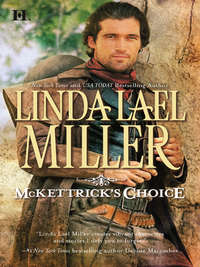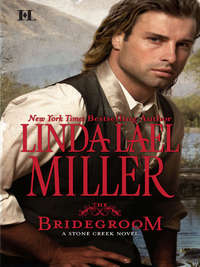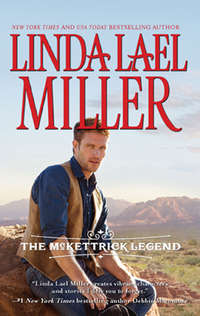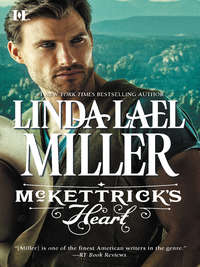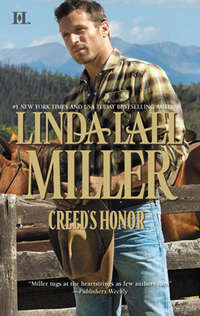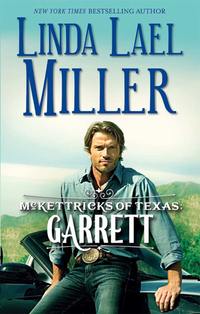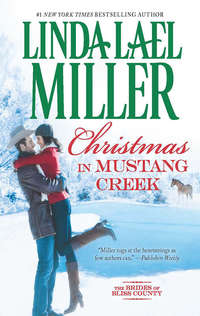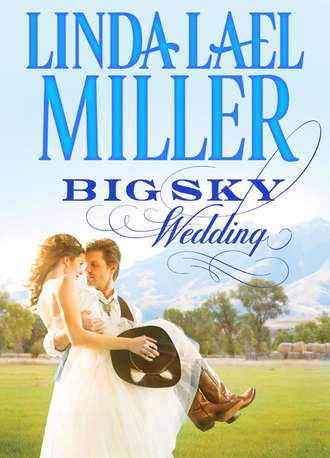
Полная версия
Big Sky Wedding
“He’s awesome,” Clare said, softening visibly.
“And you met him at youth group?” Tread carefully here, Aunt Brylee. This is treacherous ground.
“I met him at a basketball game last fall,” Clare replied. “He was a senior then, and now he’s got a full-time job at the pulp mill. He joined the youth group just last week.”
“Isn’t nineteen a little old for youth group?”
“They let him in, didn’t they?” Clare reasoned, developing an edge. “It’s not as though he’s a pervert or something.”
Silently, Brylee counted to ten before asking, “What’s he like? Who are his parents?”
Clare looked fitful now, squirming in her chair, her glass of cola forgotten on the table in front of her. “Now you sound like them,” she complained. “It’s not like we’re going to a drive-in movie in his car, or anything like that.”
“Luke’s out of school, and he’s too old for you,” Brylee stated reasonably. Then she arched one eyebrow and added, “He has a car?”
“He has a driver’s license,” Clare said, defensive now.
Brylee sighed wearily. Nineteen, a job at the pulp mill and a driver’s license but, five will get you ten, no car. And what was this Luke yahoo doing in youth group? If he wanted to be part of the church community, there were certainly other options....
She paused, remembering how it felt to be very young, like Clare. Brylee’s own mother hadn’t been around much when she was growing up, but her dad had paid close attention to her activities, along with Walker’s. He’d been a real drag at times, wanting all the whys and wherefores, insisting on knowing all her friends, and she’d been rebellious, resentful—and very, very safe.
Now, she was getting a glimmer of what she must have put the poor man through, all because he wanted to protect her. She’d gone on to college, built a business and a good life for herself, while some of her friends, notably those whose parents were less vigilant, had fallen into all sorts of traps—unwanted pregnancies resulting in early and ill-fated marriages, lost scholarships, dead-end jobs.
In that moment, Brylee missed Barclay Parrish with a keen sharpness radiating from behind her breastbone, wished she’d thought to thank him for caring so much about her and Walker both before he’d died, over a decade before, of a heart attack, instead of now.
“What’s the hurry, Clare?” she asked softly. “You’re only sixteen, remember?”
Seeing a protest forming in Clare’s stormy eyes, Brylee held up both hands in a bid for silence so she could go on.
“I know you think you’re mature for your age, and you probably are, actually, but trust me, you don’t know as much about the world as you think you do.” Who does?
“You don’t trust me,” Clare accused quietly. “Or Luke, either.”
“I do trust you,” Brylee said. “You’re a very smart young lady with a good heart. But this Luke person? Maybe he’s nice and maybe he isn’t—I don’t claim to know.”
“He goes to youth group,” Clare reminded Brylee, her tone indicating that that one fact made him a saint. “At church.”
“Then why not tell your folks about him?” Brylee argued. She had to say what she thought here, but she was worried about alienating Clare. The girl had come to her in confidence, after all—would she clam up after this? Start keeping secrets that might be a lot more dangerous than plans to sit together on a bus and hold hands “and stuff” with a nineteen-year-old, whenever they weren’t being watched? Which, admittedly, with Opal on the job, would be never.
On the other hand, though, somebody had dropped the ball at some point. Was it possible that Opal and Walter didn’t know Luke’s age?
“Are you going to tell them?” Clare countered. “Mom and Dad, I mean?”
Brylee sighed. “No,” she said, wanting to strike a balance of some kind, keep the door of communication open between her and her brother’s child and do the right thing, too. What if something bad happened? She’d never be able to forget that she could have prevented whatever it was just by speaking up.
“You promise?” Clare was wheedling now. No doubt about it, the kid was a charmer and, besides, Brylee loved her.
She gave another sigh, this one heavier than the last. “I promise.”
“Good. Then I’m not telling Mom and Dad, either,” Clare said, pushing back her chair and standing up.
Snidely, finished with his kibble ration, sat nearby, watching the girl with concern.
Brylee felt a headache coming on. All her adult life she’d dreamed about being a mother, but she was learning pretty quickly that it was no job for wimps.
She remained at the table, stomach churning, for several minutes after Clare left by the back door without saying another word—not even goodbye.
Finally, Brylee left her chair, rummaged through her purse for her cell phone and scrolled through her contact list. Coming to a certain name, she thumbed the connect button and waited.
She’d given her word that she wouldn’t mention Clare and Luke’s plans for the youth group trip—which might be entirely innocent, on Clare’s side, but probably weren’t on the guy’s end—not to Walker and Casey, that is.
But she hadn’t promised not to tell Opal.
* * *
THE ELECTRICITY WAS ON—cause for celebration from Zane’s point of view. He and Slim made a quick trip to town in the truck, loaded up on grub and sundries, along with an inflatable mattress and some sheets, blankets and pillows, and promptly headed home again.
After doing some scrubbing, mostly focused on the kitchen, Zane boiled up half a package of hot dogs on the temperamental flat-top stove, and shared the meal with Slim. No sense in dirtying up a plate—he used a paper towel instead.
Easy cleanup, that was Zane’s modus operandi. He wasn’t an untidy person, especially when it came to personal grooming, but he’d depended on his California housekeeper, Cleopatra, for so long that he was spoiled.
Thinking of Cleo, Zane felt a pang of guilt. He’d given her a nice severance package—meaning he’d left her a hefty check and a note before he and Slim headed north—but otherwise, he’d basically left her high and dry. A cranky black woman with a gift for cooking that was positively cosmic in scope, she normally didn’t get along with “Hollywood types” to use her term. She’d made an exception for Zane, and now he’d gone off and left her to fend for herself in a crappy economy, in a place where integrity, like beauty, was often skin-deep.
Even in Glitzville, folks were feeling the pinch of tough times, cutting back on the luxuries. What would happen to Cleo, once she’d used up that last check, sizable though it had been?
Engaged in grim reflection, Zane was startled when his cell phone rang in the pocket of his shirt. Frowning—he was not a phone man—he checked the caller ID screen, saw his brother’s name there and grimaced even as he answered. “Hello, Landry.”
Landry, a year younger than Zane, gave credence to the changeling theory, since the two of them were so different that it was hard to believe they shared the same genetic makeup.
“We have a problem,” Landry announced.
Zane closed his eyes briefly, recovered enough to open them again and retort, “‘We’? It just so happens things are going pretty well at the moment, out here.”
“Congratulations,” Landry all but growled. “But we still have a problem, and his name is Nash.”
Nash. Their twelve-year-old half brother, the one neither of them really knew. Nash was the product of one of their feckless father’s many romantic liaisons—the boy’s mother, if Zane recalled correctly, was a former flight attendant named Barbara, who had a penchant for belly dancing, an overactive libido and a running start on a serious drinking problem. A creative baby-namer—“Zane,” for instance, and “Landry”—Jess Sutton had never been much for hands-on parenting. He liked to make kids, give them names and then move on, leaving their moms to raise them however they saw fit.
“I’m listening,” Zane said, after suppressing a sigh that seemed deeper than the well outside, the one rumbling up sluggish but clean supplies of water, now that the electricity was turned on and the pump actually worked.
“Dad just dropped him off here,” Landry said, in an exaggerated whisper that led Zane to believe the boy was within earshot and, therefore, might overhear. “I can’t take care of a kid, Zane. I’ve got a business meeting in Berlin tomorrow—get that? tomorrow—and Susan and I are on the outs. In fact, she’s leaving.” A pause. “Not that she’d be willing to help out, anyhow.”
Landry’s love life was only slightly less of a train wreck than Zane’s own had been, an uncomfortable indication that they’d inherited more from their old daddy than good teeth, fast reflexes and a passion for risk-taking. “Again?” he asked, letting a note of sarcasm slip into his voice. Susan and Landry had been married—and divorced—twice, at last count. Their marriage reminded Zane of a dizzying carnival ride; somebody was always getting on, or off.
Landry drew in a breath and let it out in a huff. Even though he was the younger of the two, he regarded himself as the responsible, reliable brother, considered Zane a loose cannon with more luck than sense. “I didn’t call so we could discuss my personal life,” Landry bit out. “The kid—Nash—needs somewhere to stay. Pronto. I was about to put him on the next flight to L.A. when it occurred to me that you might be on location someplace, pulling down ludicrous amounts of money for doing nothing special. Where are you?”
“I’m not in L.A.,” Zane said evenly. “I’m on the ranch in Montana—you know, the one we bought together a few years back, pretty much just for the hell of it?”
“What the devil are you doing there?” Landry demanded. It didn’t seem to bother him that he was pushing the envelope, given that he obviously planned on asking a favor.
A greenhorn through and through, Landry wore custom-made three-piece suits, lived in a massive penthouse condo in Chicago, employed a chauffeur and even a butler, which was just plain embarrassing, if you asked Zane, which, of course, nobody had. A complete stranger to horses and every other aspect of country life, Landry ponied up the money to pay for his half of the ranch as some kind of tax maneuver.
“I got tired of, well, just about everything,” Zane admitted, suddenly weary. The inflatable bed hadn’t held out much appeal earlier, especially since it was womanless, but by then, he’d started to think he could sleep for days, if not decades. “So I left.”
“Whatever.” Landry sighed. Dealing with Zane was an ordeal for him, what with his blatant superiority and all. “You have to take Nash,” he said. “Dad dumped him on me—evidently our dear father has to lay low for a few months until his poker buddies calm down enough to change their minds about having his knees broken. It’s you or foster care, and I think the poor kid’s had his fill of that already.”
“What about Barbara?” Zane asked moderately. “You remember her? Nash’s mother?”
“She’s out of the picture,” Landry said. His tone was flat, matter-of-fact.
Their own mother, an early casualty of Jess Sutton’s incomprehensible charm, had died a few years before of a lingering illness. Disagreements about how to care for Maddie Rose at the end remained a major sore spot between the two brothers.
“How so? Is Barbara sick? Dead?”
“She’s somewhere in India or Pakistan—one of those third-world countries—on some kind of spiritual quest,” Landry replied with disdain. “That’s Dad’s story, anyway. Suffice it to say, Barbara isn’t exactly a contender for Mother of the Year.”
“And this is my problem because...?” Zane asked, stalling. He couldn’t turn his back on his own flesh and blood and Landry knew that, damn him. Still, it was an imposition, a responsibility he wasn’t prepared to take on at this juncture, when his whole life was in transition.
“Because Nash is your brother,” Landry said, with extreme patience.
“He’s also yours,” Zane pointed out. He was already wondering what a person said to a twelve-year-old kid who’d probably been shuffled between the homes of strangers, their dad’s distant relations, the girlfriend du jour and then back through the whole cycle again. Repeatedly.
“If I don’t make this meeting in Berlin,” Landry replied, “I could lose one of my most important accounts.”
“Sucks to be you,” Zane responded mildly. “Who’s been raising this child all this time, anyway?”
“My understanding,” Landry supplied stiffly, “is that he’s been knocking around the country with Dad. Recently, that is.” His voice softened a little. “He’s not a bad kid, Zane. And he didn’t have the kind of mom who would go to bat for him, like ours did for us.”
In that moment, Zane could see his late mother—an inveterate optimist, their Maddie Rose—in such vivid detail that she might as well have been standing right there in his kitchen. She’d waited tables for a living, and the three of them had lived out of her beat-up old station wagon more than once, when she was between waitressing gigs, but life had been good with her, despite all the Salvation Army Christmases and secondhand school clothes and food-bank vittles. She’d had a way of “reframing” a situation—her word—so that moving on, when a job ended or a romance went sour, always seemed like an exciting adventure instead of the grinding hardship it usually was. Even when it involved considerable sacrifice on her part, Maddie Rose always made sure they stayed put when school was in session, come hell or high water, and she’d checked their homework and encouraged them to read library books and made them say grace, too.
As always, he wished Maddie Rose had lived to see her elder son become something more than a rodeo bum, wished he could have set her up in a good house and made sure she never lacked for anything again, but, too often, life didn’t work that way.
She’d died in a hospital somewhere in rural South Dakota, a charity case, suffering from an advanced case of leukemia, before Zane could so much as cash his first Hollywood paycheck, let alone provide for her the way he would have done, given the chance.
Although he and Landry usually avoided the whole topic of Maddie Rose’s death, it lay raw between them, all right, like a wound deep enough to rub the skin away, and, even now, it hurt.
“Send Nash to Missoula,” Zane heard himself say. “Let me know when he’s getting in, and I’ll be there to pick him up.”
“Good.” Landry almost murmured the word. “Good.”
It wasn’t a thank-you, but it would have to do.
Zane didn’t ring off with a goodbye. He simply hit the end call button and sent his phone skittering across the tabletop, causing Slim to perk up his mismatched ears and straighten his knobby spine.
Zane grinned, then ruffled the hide on the dog’s back to reassure him. “You’re not in any kind of trouble, boy,” he told Slim. Then, with a philosophical sigh, he added, “And that makes one of us.”
* * *
THE NEXT AFTERNOON, Zane was late getting to the airport in Missoula, and it was easy to spot Nash, since the kid was standing all by himself, next to the luggage carousel, a battered green duffel bag at his feet. Earbuds piped music into his head, and his blondish-brown hair stood up in spikes, as though he’d been accidentally electrified. Seeing Zane, he scowled in recognition and dispensed with whatever tunes he’d been listening to while he waited.
“Montana sucks,” Nash said sullenly, and without preamble. “I thought I was going to Hollywood, and now I find out I’m stuck here.”
“Life is hard,” Zane replied, smoothly casual, “and then you die.”
Nash rolled cornflower-blue eyes. His clothes were a sorry collection of too-big jeans, cut off at the knees and showing a good bit of his boxers, sneakers with no laces, a ragged T-shirt of indeterminate color and a pilled hoodie enlivened by a skull-and-crossbones pattern in neon green. “Thanks for the 411,” he drawled, making it plain he’d already mastered contempt, even before hitting his teens. “I probably couldn’t have figured that out on my own.”
Zane sighed inwardly and reminded himself to be patient. Maddie Rose had seen that he and Landry had it good, in comparison with most poor kids, but Nash had been through the proverbial wringer.
“You hungry?” he asked the boy, stooping to pick up the duffel bag by its frayed and grubby handle.
“I’m always hungry,” Nash replied, without a shred of humor. “Just ask Dad. I’m a royal pain in the ass, wanting to eat at least once a day, no matter what. Too bad the kind of motels he could afford didn’t have room service.” A beat passed. “I was lucky to get a bed.”
Zane felt a clenching sensation—sympathy—but he didn’t let it show. He remembered all too well how poverty ground away at a person’s pride, how he’d hated it when people felt sorry for him and Landry. “Let’s get out of here,” he said. “We’ll find you some food once we’ve left the airport.”
Nash said nothing. He simply put his earbuds back in and rocked to some private serenade, ambling alongside Zane as they left the terminal and made their way to the outdoor parking area, where the truck waited.
Slim was there, pressing his nose against a partially lowered window as they approached. He gave a happy yelp of welcome and scrabbled to and fro across the backseat, unable to contain his excitement.
“You have a dog?” Nash asked, opening up his ears again and almost, but not quite, smiling.
“His name is Slim.” Zane confirmed the obvious with a nod, as he opened the truck’s tailgate and tossed the duffel bag inside. “Knows a thing or two about hard luck, I guess.”
“Then we ought to get along,” Nash replied, sounding far too world-weary for a twelve-year-old. “The dog and me, that is.”
CHAPTER THREE
NASH LOOKED AROUND the ranch house kitchen with a discerning eye—surprisingly discerning, in fact, for somebody in a skull-and-crossbones hoodie, with six inches of underwear showing above his belt line.
“Man,” he said, quickly evaluating the long-neglected space surrounding them. “This place is seriously underwhelming.”
“Kind of like your manners,” Zane retorted lightly, but without rancor. In the few hours he’d spent with this young half brother of his, he’d begun to understand the kid a little better. Nash probably thought he was doing a good job of hiding what he felt, but he was scared all right, jumpy as a cat in a room full of cleated boots. Ready to be shunted off at a moment’s notice to the next place where he wouldn’t fit in, and determined not to let anybody know he gave a damn when it happened. He’d consumed three cheeseburgers, a double order of curly fries and a milk shake when they stopped for lunch on the outskirts of Missoula, prompting Zane to wonder if Landry had fed him a meal or two before hustling him on board the first westbound plane with an available seat.
And then there were those god-awful clothes. Going by appearances, his duds being rumpled, worn-out and not recently washed, the kid might have made the whole trip in the cargo hold instead of the main cabin. Landry, the multimillionaire investment whiz, couldn’t have sprung for a few pairs of jeans and some T-shirts?
Most likely, Zane thought, with a stifled sigh, his brother hadn’t wanted to be bothered with anything so mundane as taking the boy to the nearest mall and outfitting him with the basics. After all, he had to get to Berlin, where he had an Important Meeting.
The message in that was obvious: the meeting was important, but Nash wasn’t. Susan, the soon-to-be ex-wife—again—had probably come to the same conclusion about her own place in Landry’s high-octane life.
Zane seethed a little, feeling self-righteous—until he recalled that, up until Landry’s phone call, he couldn’t have said where Nash was, what he was doing, who he was with. He hadn’t kept any better track of his kid brother than Landry had.
The boy was blood. How had he been able to ignore that fact for so long?
“Where do I put my stuff?” Nash asked, breaking into Zane’s rueful thoughts, having reclaimed the duffel bag when they got out of the truck a few minutes before. “By the back door, maybe?”
“You plan on making a quick getaway?” Zane countered evenly, as he refilled Slim’s water bowl and set it on the floor so the thirsty dog could drink.
Nash responded with a mocking grin. “You never know,” he said. He made a hitchhiking motion with one thumb. “I’m a travelin’ man.”
“You’re a kid,” Zane pointed out, after taking a few seconds to rule out the snarky answers that came to mind ahead of that one. Leaning back against the sink, he folded his arms while Slim lapped loudly from the bowl of water. “And you ought to know, better than most, how mean the big world out there can really be.”
Nash didn’t bat an eyelash; he was already a hard case—at twelve, for God’s sake. “But I’m safe now, right?” he drawled, dripping sarcasm. “No worries. You’re going to give me a home, right here on the range.”
A familiar desire to find Jess Sutton and throttle the man with his bare hands washed over Zane, but it was quickly displaced by a flash of admiration for Nash. The kid might be a smart-ass, but he had a quicksilver brain.
“Where, as it happens,” Zane responded, playing along, “the buffalo don’t roam.”
Nash rolled his eyes, then his shoulders. He was on the small side, and skinny and raw-boned, but he’d match Zane’s six-foot height one day in the not-too-distant future, maybe even exceed it.
“Can I take a look around?” the boy asked, sounding glum. Obviously, he wasn’t expecting much.
“Be my guest,” Zane answered. “Pick out a bedroom while you’re at it. There are plenty to choose from.”
Offering no comment, Nash wandered off to explore the premises. He was gone for a while, Slim trailing faithfully after him, which gave Zane a chance to assess the grub situation, peering into the fridge, opening and closing cupboard doors. Despite yesterday’s shopping trip in Three Trees, it wasn’t a pretty picture.
“Don’t you have any furniture?” Nash asked, upon his return.
Zane shook his head. His household goods were still in L.A., in his condo, and he already knew there was no point in having all that expensive junk trucked to Montana. None of it would look right here—especially his bed. It was a gigantic, mirrored thing, a monument to unbridled hedonism, lacking only notches on one of the pillar-size posts to tally his conquests.
He would miss the water-filled mattress, though.
All the other pieces—chairs and couches, a dining room set, a TV so big it took up a whole wall—were decorator-approved and half again too fancy for a run-down stone ranch house. Like the bed, they’d be so ostentatious as to be an embarrassment.
Not that he’d be showing off his sleeping quarters anytime soon, of course.
When an image of Brylee Parrish seeped into his mind like smoke, he nearly laughed out loud. As if, he thought. She’d probably already written him off as a hedonistic, interfering movie star, but even if she hadn’t, she would once she checked all the online gossip sites and found his name on practically every one of them.
“Just moved here myself,” he finally replied, feeling a distinct lack of nostalgia for the old place back in L.A., and the fast-paced life that went with it. “I haven’t had time to make a plan, let alone shop for a houseful of stuff.” By then, he was sitting at the card table in the center of the kitchen, with his laptop open. It was time to do a little research on child-rearing. “Anyway, there’s a lot to be done around the place, as you’ve probably noticed.”
Nash dragged back the second folding chair, which completed the dining ensemble, and fell to the seat with a sigh. “It’s not so bad,” he said, taking Zane by surprise. Had the kid actually said something civil? “Anyway, beggars can’t be choosers. That’s what my mom always tells me. When I can find her, that is.”
“You’re not a beggar, Nash,” Zane said, looking up from the computer screen, which indicated that he had a shitload of emails waiting for him. A daunting prospect, since at least eight of them were from his ex-wife, Tiffany. Tiffany. What had he been thinking, marrying that woman-child? Maybe he’d give her the monumental water bed; God knew, she’d get plenty of use out of it, and maybe even sleep once in a while. “You’ve had a run of hard luck, that’s all. It happens to the best of us.”


